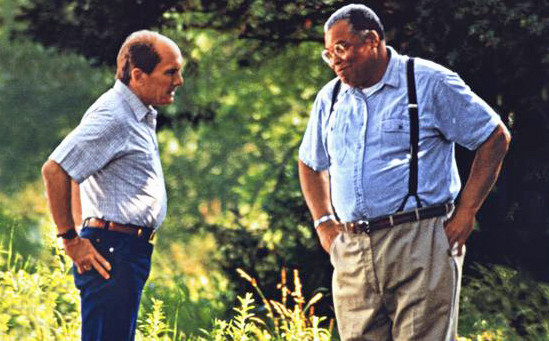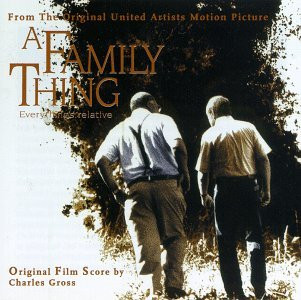Robert Duvall. The name itself conjures images of iconic westerns and gritty crime dramas. To celebrate the legendary actor’s birthday, I embarked on a personal Robert Duvall film marathon, and it led me to a movie I’d previously overlooked: A Family Thing Movie (1996). While initially released to little fanfare, and frankly, not something that grabbed my attention as a younger viewer, revisiting it now offered a profoundly different experience. What I found was a deeply moving film that explores the complexities of family, race, and reconciliation in a way that feels incredibly relevant and emotionally resonant.
 Robert Duvall and James Earl Jones in a pivotal scene from the 1996 family drama "A Family Thing movie," showcasing the tense dynamic between their characters.
Robert Duvall and James Earl Jones in a pivotal scene from the 1996 family drama "A Family Thing movie," showcasing the tense dynamic between their characters.
Unpacking the Narrative of “A Family Thing”
A Family Thing movie begins in the quiet rurality of Arkansas, where Earl Pilcher Jr. (Robert Duvall) receives a life-altering letter from his recently deceased mother. The revelation within is seismic: Earl learns his biological mother was a Black woman named Willa Mae, who passed away during his birth. He also discovers he has a half-brother, Ray Murdock (James Earl Jones), a police officer residing in Chicago. Driven by a mix of anger towards his father’s deception and a desire to honor his mother’s last wish, Earl journeys to Chicago to meet Ray.
The initial encounter between Earl and Ray is far from warm. Prejudice and resentment simmer beneath the surface. Yet, circumstance leads Earl to stay at Ray’s home, where he’s introduced to Ray’s insightful Aunt T. (Irma P. Hall), Willa Mae’s sister, and Ray’s withdrawn son, Virgil (Michael Beach). The film then delicately navigates the strained interactions between these men as they grapple with a shared history shrouded in secrets. The central question becomes: can Earl and Ray overcome their initial animosity and forge a familial bond amidst the tangled threads of their past?
More Than Just a Movie About Race: The Universal Truths in “A Family Thing”
What truly struck me about A Family Thing movie was its profound emotional depth. It’s a film that doesn’t shy away from the uncomfortable realities of prejudice and past transgressions. However, at its core, it’s a story about the messy, complicated nature of human relationships. Life, as the film portrays, is full of disappointments, both given and received. This raw honesty is perhaps why the film resonated with me so deeply, eliciting a genuine emotional response.
In my younger years, the nuances of A Family Thing movie likely would have been lost on me. Naivety can often blind us to the complexities of human connection and the weight of unspoken histories. But as life experience accumulates, the film’s themes of forgiveness, understanding, and the enduring importance of family gain significant weight. In 2025, the narrative of two men confronting a painful shared heritage and choosing to move forward together feels incredibly poignant and relatable.
Stellar Performances Elevate “A Family Thing Movie”
The success of A Family Thing movie hinges on the strength of its cast, and in this regard, the film is an absolute triumph. Robert Duvall delivers a masterclass in portraying Earl, a man grappling with deeply ingrained prejudices while confronting a shocking truth about his identity. The scene where Earl confronts his father is a powerful display of nuanced acting.
James Earl Jones is equally compelling as Ray, a man burdened by years of suppressed resentment towards Earl’s father. Jones expertly balances Ray’s initial bitterness with an underlying decency that prevents him from outright rejecting Earl. His internal conflict is palpable, making his eventual softening towards Earl all the more impactful.
However, it is Irma P. Hall as Aunt T. who arguably steals the show. Her performance is nothing short of extraordinary. As the blind but incredibly perceptive matriarch, Aunt T. sees through the facades of both men, urging them to recognize the fundamental bond of family that transcends racial divides. Her wisdom and unwavering belief in their connection serve as the emotional anchor of A Family Thing movie, and her performance deserved serious Oscar consideration.
Why “A Family Thing” Still Matters Today
While A Family Thing movie might condense the timeline of reconciliation for dramatic effect, it captures a profound truth about the power of human connection. Earl and Ray could have easily remained strangers, their lives continuing on separate paths. But their willingness to confront a difficult past and embrace the messy reality of their shared bloodline is what makes the film so meaningful. It’s a testament to the idea that family, in all its imperfect forms, truly does matter.
If you’re searching for a film that explores complex family dynamics with sensitivity and depth, A Family Thing movie is a must-watch. It’s a reminder that even amidst pain and prejudice, the potential for connection and forgiveness endures.
 Watch the official trailer for "A Family Thing movie," a compelling family drama starring Robert Duvall and James Earl Jones.
Watch the official trailer for "A Family Thing movie," a compelling family drama starring Robert Duvall and James Earl Jones.
Here’s the trailer for A Family Thing movie.

